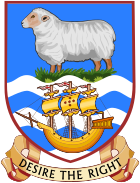Governor of the Falkland Islands
| Governor of the Falkland Islands | |
|---|---|
 Coat of Arms of the Falkland Islands | |
 Standard of the Governor of the Falkland Islands | |
| Viceroy | |
| Style | Her Excellency |
| Residence | Government House, Falkland Islands |
| Appointer | Monarch of the United Kingdom |
| Term length | At His Majesty's pleasure |
| Formation | 1764 |
| First holder | Louis Antoine de Bougainville as Administrator of the French Settlement |
| Website | Office of the Governor |
 |
|---|
The governor of the Falkland Islands is the representative of the
History
The history of the leadership on the islands is closely related to the
In 1829
The first governor of the Falklands was
Following the
Appointment and powers
The governor is appointed by the
Under the Constitution, executive authority of the Falkland Islands is vested in the King, and his authority is exercised on his behalf by the governor.
Acting on the advice of the Executive Council, the governor has the power to call a meeting of the Executive Council, dissolve the Legislative Assembly and call a
In most cases, the governor must consult with the Executive Council and accept its advice. There are exceptions, however, set out in the constitution, when the governor is permitted to not consult the council and even go against its advice, but in this eventuality, the governor is required to inform the secretary of state in the United Kingdom of the reasons for this action, and in the case of blocking laws passed by the Legislative Assembly, the secretary of state must give prior authorisation. Under section 67 of the constitution, the governor may go against the advice of the council if in his or her judgement, it would be right to do so in the interests of good governance or if such advice would affect external affairs, defence, internal security (including the police), administration of justice, audit, appointments to the public service, the discipline and removal from office of public officers, and the management of the public service. In all these instances the members of the Executive Council can appeal to the secretary of state.
The governor is also responsible for the defence and internal security of the Falklands (with the exception of police matters), although the governor is constitutionally obliged to consult with the commander of the British Forces on such matters.[7]
Acting governor
If the office of governor ever becomes vacant or if the incumbent governor is absent from the Falklands or unable to perform his or her duties, the King, on the advice of his secretary of state, can appoint an acting governor under section 24 of the constitution. The acting governor must take the oath before assuming office and has all the powers and duties of the governor until a new governor is appointed or the incumbent governor is able to carry on with his or her duties.[8]
Oath or affirmation
Under section 23(3) of the constitution, before entering upon the functions of his or her office, the governor must take the oath of allegiance and the oath of office. The wording for the oath of office is specified in Annex B to the Constitution:
"I, name, do swear (or solemnly affirm) that I will well and truly serve His Majesty King Charles the Third, His Heirs and Successors, and the people of the Falkland Islands, and will uphold the Constitution and other laws in force in the Falkland Islands, in the office of Governor. (So help me God.)"
References
- ^ "As of Saturday, Falklands have the first woman Governor, Ms Alison Blake CMG". MercoPress. 23 July 2022.
- ^ "The Falkland Islands Constitution Order 2008 Section 23". legislation.gov.uk. Retrieved 6 February 2023.
- ^ "Government House". Falkland Islands Tourist Board. Retrieved 6 February 2023.
- ^ "History of the Falkland Islands". Britannica. Retrieved 6 February 2023.
- ^ "The Falkland Islands Constitution Order 2008 Section 23". legislation.gov.uk. Retrieved 6 February 2023.
- ^ "The Falkland Islands Constitution Order 2008 Section 23". legislation.gov.uk. Retrieved 6 February 2023.
- ^ "The Falkland Islands Constitution Order 2008 Section 25". legislation.gov.uk. Retrieved 6 February 2023.
- ^ "The Falkland Islands Constitution Order 2008 Section 24". legislation.gov.uk. Retrieved 6 February 2023.
Sources
- "Falkland Islands Government Website". falklands.gov.fk. Archived from the original on 27 January 2012. Retrieved 10 June 2010.
- "Falkland Islands (British Overseas Territory)". Foreign and Commonwealth Office. Archived from the originalon 25 September 2012. Retrieved 10 June 2010.
- "The Falkland Islands Constitution Order 2008" (PDF). falklands.gov.fk. 1 January 2009. Archived from the original (PDF) on 23 November 2009. Retrieved 10 June 2010.
- "Falkland Islands info". falklands.info. Archived from the original on 2 May 2010. Retrieved 10 June 2010.
- "World Statesmen - Falkland Islands". worldstatesmen.org. Retrieved 10 June 2010.
External links
 Media related to Governors of the Falkland Islands at Wikimedia Commons
Media related to Governors of the Falkland Islands at Wikimedia Commons

